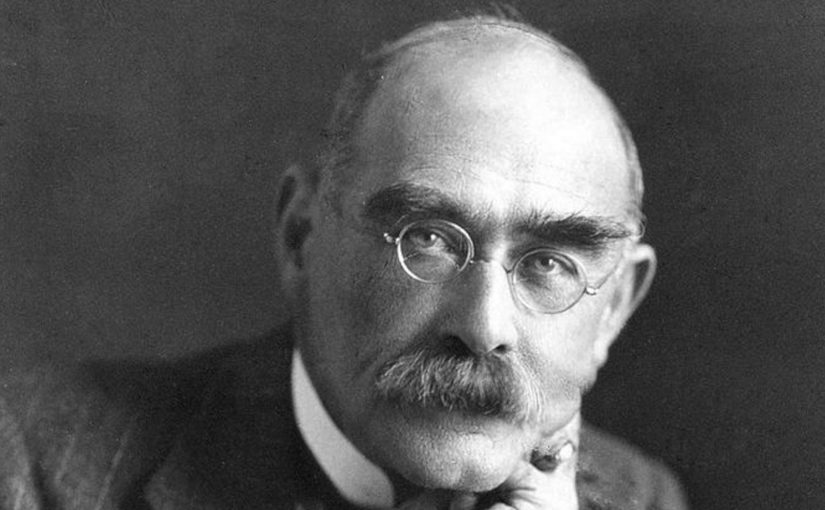The poem celebrates the equality which reigns among Freemasons without distinction of profession, rank, race or creed and the first two stanzas clearly reflect the diversity of this particular Lodge, underscored by the refrain which contrasts the behaviour displayed in public with that shown inside the Lodge.
| There was Rundle, Station Master, And Beazeley of the Rail, And Hackman, Commissariat, And Donking of the Jail; And Blake, Conductor-Sergeant, Our Master twice was he, With him that kept the Europe-shop, Old Framjee Eduljee. Outside – ” Sergeant! Sir! Salute! Salaam! Inside – ‘Brother,” and it doesn’t do no harm. We met upon the Level and we parted on the Square, And I was junior Deacon in my Mother-Lodge out there! We had Bola Nath, Accountant, And Saul the Aden Jew, And Din Mohammed, draughtsman Of the Survey Office too; There was Babu Chuckerbutty, And Amir Singh the Sikh, And Castro from the fitting-sheds, The Roman Catholic! We hadn’t good regalia, And our Lodge was old and bare, But we knew the Ancient Landmarks, And we kept them to a hair; And looking on it backwards It often strikes me thus, There ain’t such things as infidels, Except, perhaps, it’s us. For monthly, after Labour, We would all sit down and smoke (We dared give no banquets, Lest a Brother’s caste were broke), And man on man got talking Religion and the rest, And every man comparing Of the God he knew the best. So man on man got talking, And not a Brother stirred Till morning waked the parrots And that damned brain-fever-bird. We would say it was highly curious, Ans we would all ride home to bed, With Mohammed, God, and Shiva Changing pickets in our head. Full oft on Guv’ment service This roving foot hath pressed, And bore fraternal greetings To the Lodges east and west, According as commanded. From Kohat to Singapore, But I wish that I might see them In my Mother-Lodge once more! I wish that I might see them, My Brethren black and brown, With the trichies smelling pleasant And the hog-darn passing down; And the old khansamah snoring On the bottle-khana floor, Like a Master in good standing With my Mother-Lodge once more. Outside – Sergeant! Sir! Salute! Salaam!’ Inside- Brother,” and it doesn’t do no harm. We met upon the Level and we parted on the Square, And I was Junior Deacon in my Mother-Lodge out there! |
Background Rudyard Kipling was the author of the children's novels The Jungle Book (1894) and Just So Stories (1902). His most successful novel was Kim (1901). He was initiated into the Lodge of Hope and Perseverance No 782 (founded in 1858 under the English Constitution) at the Masonic Hall, the Jadughar (as described in Kim) in Anarkali, Lahore on 5 April 1886, at the age of twenty. As this was the Lodge into which he was initiated it became his Mother Lodge. A Freemason will always have a particular attachment to the Lodge which saw him enter into Freemasonry, even though he may cease to be a member of that particular Lodge. The poem was written some eight years later, when he was living in Vermont. Charles Carrington in his The Complete Barrack-room Ballads (p.166), reports that it was written in a single day, on October 29th 1894, while Conan Doyle was staying with the Kiplings. First published in the The Pall Mall Gazette and the Pall Mall Budget on May 9th 1895. In the Sussex Edition the poem is dated 1894.
SOURCE: The Kipling Society
The following exchange is from Kipling’s story The Man who would be King which was put on film in 1975 and interpreted by Michael Caine and Sean Connery. A Masonic introduction convinces Rudyard Kipling to assist Peachy, after first being reluctant to do so. Michael Caine and Chritopher Plummer in the classic movie ‘The Man Who Would Be King’.
Latest posts by Aldo Reno (see all)
- His Majesty’s Servant , David Garrick Esq – Freemason ? - June 7, 2024
- Influencia de la Masonería en Chile - April 29, 2024
- Pomegranate in Freemasonry – its significance - March 11, 2024

